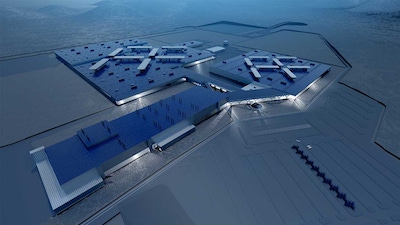Electric vehicle plants experience fits and starts
Construction work has been suspended on Faraday’s mega plant because of financial problems, but the company pledges to showcase its first production car at CES 2017 next month.
December 6, 2016

It appears that electrical vehicle manufacturing plants are experiencing fits and starts, much like a gasoline-powered vehicle with a partially clogged fuel line. Recent news reports in manufacturing.net, Teslarati and Automotive News noted that electric vehicle startup Faraday Future stopped construction on its “massive factory” in Nevada in the wake of its parent company’s financial problems.
|
Construction of Faraday Future's plant near Las Vegas has stalled. |
Faraday, a 2015 startup with hopes of challenging Tesla Motors in the electric vehicle market, seemed to come out of nowhere with a big announcement regarding plans to build a factory outside Las Vegas with the help of millions in state tax incentives. That raised the curiosity of a number of skeptics about the nascent company and its vehicle production plans and staff, but especially its financial support.
According to one news report, “Faraday scrapped most of its projected product line and featured only a non-functioning prototype at its high-profile debut early this year.” One of the company’s main funding sources, Jia Yueting, founder of Chinese media and tech giant LeEco, lost a considerable amount of his fortune in the market turmoil in his native country.
Faraday broke ground on the Nevada plant on the promise to obtain funding through a bond to guarantee that construction on the facility would move forward. However, auto blog Jalopnik reported that work had stopped for now after the contractor “completed grading and foundation prep work.”
According to a report from NBC news affiliate KSNV, state Treasurer Dan Schwartz, commented that the plans to build the $1 billion factory “was over pretty much before it began. I think [Jia Yeuting ran] out of money.” Schwartz noted that sources in China said that the government there isn’t financing him.
Nevada struck a deal with Faraday Future nearly a year ago, agreeing to provide the startup with $337 million in incentives including $175 million in bonds. However, Schwartz told KSNV that he refuses to sign any bond until Faraday Future can prove it has the finances to back it up. Schwartz blames the situation on Nevada governor Brian Sandoval, telling KSNV, “I don’t think he’s plugged into what is going on in the state. I think the governor owes it to the people of the state to tell us what’s going on here.”
The construction company told Jalopnik that it was expected to start again in 2017. Faraday Future now promises to showcase its first production car at CES 2017, the international electronics show in Las Vegas on January 5 to 8.
Let’s hope that Arizona has better luck than Nevada in the electric vehicle manufacturing sector. Electric car startup Lucid Motors plans to invest $700 million to build a plant in Casa Grande, AZ, just south of Phoenix, eventually hiring 2,000 people to build the high-end luxury electric vehicle. The Silicon Valley automaker formerly named Atieva said it will begin construction in 2017 and start production on an as yet unnamed vehicle by late 2018, according to a press release from Arizona governor Doug Ducey’s office.
“Lucid Motors’ expansion into Casa Grande is the latest evidence that Arizona leads the nation in attracting innovative technology companies to our state,” Ducey said. “This project will create thousands of new direct jobs, support many more indirect jobs and attract new suppliers to the Casa Grande region.”
Following an extensive search across 13 states and 60 sites, Lucid Motors selected Arizona based on numerous positive factors including business climate, infrastructure, talent, geographic location and the automotive supply chain in the Arizona-Sonora mega region.
About the Author(s)
You May Also Like





